UMN RecWell is looking to make an impact in EDI and well-being through staff training, summer youth programs and creative pivots in a year of turmoil.
On May 25, 2020, in Minneapolis, Minnesota, the death of George Floyd shook the nation to its core.
For over nine minutes, Floyd was pinned to the ground by a police officer’s knee on his neck. His death was ruled a homicide and the video of his murder went viral. Protests against police brutality and systemic racism erupted around the nation. But, Minneapolis was ground zero for it all.
As such, the University of Minnesota’s (UMN) Recreation and Wellness (RecWell) department navigated being at the center of such a devastating yet impactful event. “George Floyd’s murder put a spotlight on the systemic racism in our city and across the country,” said Caley Conney, the director of External Relations. “Working and living amidst the protests that followed was incredibly impactful. Our priority was the well-being of our members and staff, so we shared resources for mental health support and encouraged our staff to take the time they needed to process, reflect and heal.”
EXTRA CREDIT: When it comes to EDI, campus recreation can play a vital role. Several campus recreation centers share what they are doing.
Like many other campus rec departments across the nation, UMN RecWell had its sights set on providing new training around equity, diversity and inclusion (EDI) over the last five years. For example, the department brought in the Office for Equity and Diversity to do four half-day educational sessions covering topics from implicit bias and microaggressions to university design and equitable access.
However, the death of Floyd was an awakening moment for many in the industry. “There is so much more progress that needs to be made, and we are committed to continuing the discussion and work of equity and anti-racism,” said Conney.
And it’s been an awakening event for leaders who are looking to lead staff while facing trauma surrounding systemic racism and oppression, a pandemic, etc. George Brown, the assistant vice provost and the director of RecWell, said working on and building relationships in one’s department is where it all begins, especially when it comes to EDI work.
“This is Job One right now for everyone in our field,” said Brown.
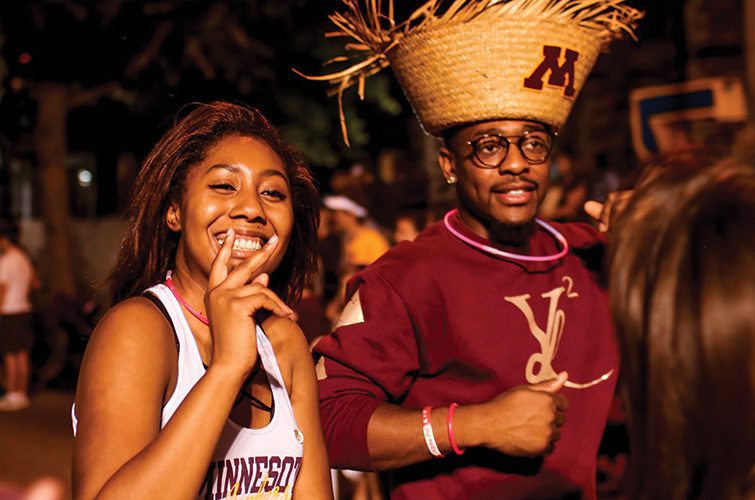
Where Does EDI Start?
He explained it starts with authenticity and honest conversations around social justice, public health anxiety, job security, etc. It’s asking: How do we genuinely talk about these things? How do we do this without a defensive posture? How do we do this without becoming protective and territorial? “I think the takeaway here is honest exchanges and dialogues,” said Brown. “In a nutshell, it’s having the vulnerability to have those conversations.”
It also requires training of all team members. Conney shared they conducted reflections and emotional check-ins following the murder of Floyd. Plus, they hosted educational sessions on the history of Juneteenth, as well as on language and how words rooted in discrimination can harm others.
In addition, University Recreation and Wellness’ other EDI training and professional development opportunities have included:
- Anti-racism discussions, including pre-work of listening to podcasts on the topic.
- Meetings with academic faculty on prison labor and equity reform and the role within department operations.
- Discussion following the presidential election on building community.
- An educational session led by The Tucker Center on Girls and Women in Sports about representation in collegiate sports programs.
- An employee discussion about women’s rights and the ERA that also included pre-work of listening to podcasts.
- UMN RecWell also brought in Dr. Rosie Ward to put on “Developing a Leadership Mindset” workshops. They explored how staff members can learn to contribute uniquely within a collective work environment. Further still, Mental Health First Aid training was offered at no cost to staff through the National Alliance on Mental Illness.
But this training doesn’t stop at the professional staff level — rather, it has also permeated UMN’s summer Youth Programs (YP), something the department has poured much into. “It’s our flagship program that we’re very proud of,” said Brown.
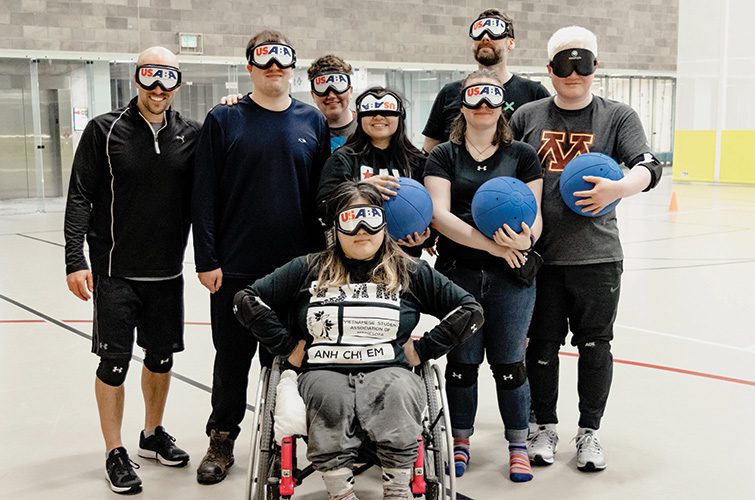
UMN RecWell Summer Youth Programs
YP has been offered for 30-plus years over the summer. Conney said they have established a reputation for solid, educational and well-rounded offerings. Most programs come about via collaboration with other departments on campus and experts in the community.
A few examples of YP include: “Grossology” where kids learn about the fun and icky side of science — in partnership with the veterinary school; a circus camp with a performance at the end of the week; and “camp in a box” offerings for families during the COVID-19 pandemic.
In order to prepare, YP summer staff are put through extensive training and student development. Pre-camp certifications include CPR/FA/AED, Youth Mental Health First Aid, Rock Wall Safety, Abuse Prevention Strategies, Safety of Minors on Campus and Mandated Reporter, and more.
Summer staff also go through three-days of in-person training. The first evening is about creating camp culture with team building activities, setting correct expectations with staff, a trans and gender non-conforming presentation, and bully prevention and awareness.
The second evening of training takes a deep dive into health and safety. Conney said it involves heavy topics but looks to build mindfulness and emphasize self-care. Topics include Active Threat with UMPD Community Engagement Team, Behavior Management, Medical and Behavioral Needs of Youth at Camp, etc.
EXTRA CREDIT: Mental Health First Aid training may be what campus rec professionals need in order to recognize and respond to the growing crisis. Katie White explains how it’s been applied and implemented at Towson University.
Lastly, the final day is all day and all things camp. Conney said there is more team building and they’ll run a mock day of camp. Staff work on things like communication, professionalism and emergency procedures. It wraps up with evaluations and a debrief before the opening ceremony of camp. After the first three weeks of camp, UMN holds a mid-summer in-service meeting and training as well.
Conney shared the results of the extensive training are many: well-prepared staff, an awesome culture, reduced accidents and incidents, retention of staff, and more
However, just as with the professional staff, UMN looks to set its summer staff up for mental and emotional success. They have access to a lounge is with hammocks, mindfulness activities like coloring books and meditation tips, and healthy snacks. Even the campers have access to a “health hut” where they can take time to relax.
It all goes back to the acronym Brown used to describe how the team leads, and that’s EGG: Empathy, Grace, Gratitude. It’s been key in leading staff, especially as COVID has required things like budget cuts and hiring freezes. “Throughout all of these challenges, our staff has been shining,” said Conney. “Both our students and professional staff have been incredible at adapting and continuing to serve our campus with smiles on their faces.”
The St. Paul Campus: A True Hybrid Program
One of the largest current adaptations is occurring at UMN’s St. Paul campus. Brown shared it has a completely different clientele to the Minnesota campus. In fact, the facility has been operating historically at a loss. The biggest issue is getting instructors over to St. Paul as many come from Minneapolis. As such, they are moving to a true hybrid program for Group Fitness in the fall of 2021, utilizing Les Mills to make this happen.
“We think this is the opportune time to stay with this really hybrid approach,” said Brown. “I think if it works and it’s novel, we’ll probably look at introducing that over the course of the next year in Minneapolis. Honestly, I think a lot of people like coming in and the socialization. While I think they have affinities to an instructor, I’m not sure they have to have that if they’re getting a quality program of the ilk like Peloton or Les Mills.”
The shift also aligns with something else Brown said — COVID-19 has impacted two cohorts of classes. For this reason, it’s not so much as welcoming students in but rather letting them know they belong, meaning they enter the space and have a place in the facility. “We’re going to have to be a little more intentional than just saying the door’s unlocked,” said Brown. “That’s where belonging is thematically going to be a resonate theme for us in the coming year.”
EXTRA CREDIT: Here is a break down the onboarding, design and delivery, and offboarding of three types of virtual training programs.
Intentionality, it seems, is a word that runs the length and depth of the UMN RecWell department. It all comes back to being intentional in relationships. From addressing the traumatic impact of Floyd’s death on staff and how campus rec can take steps to overcome systemic racism, to the mental well-being of camp instructors and the needs of incoming students during a time of budget cuts, Brown said focusing on relationships is the most fundamental thing one can do as a leader in the industry.
And that is what UMN RecWell is setting its sights on to move the needle forward.
“Building and maintaining human relationships is much more challenging than building facilities and programming but is also much more rewarding,” said Brown. “Establishing authentic, caring and mutually beneficial relationships with the wide-variety of stakeholders our field interacts with is the basis for meeting the mission and delivering experiences that enhance campus community well-being.”




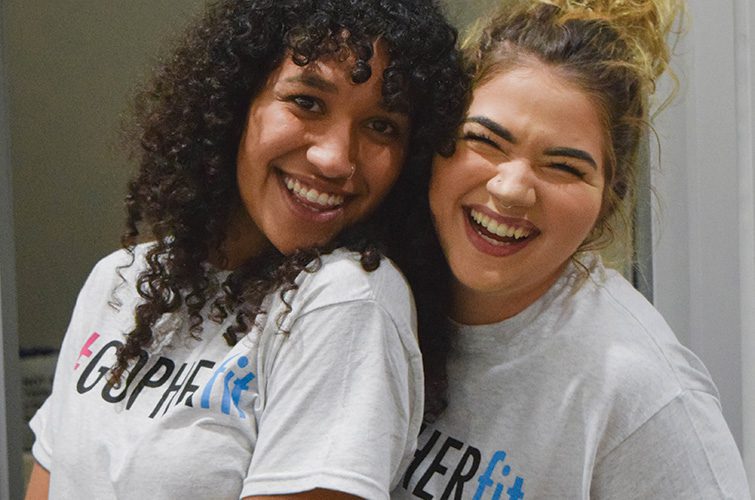
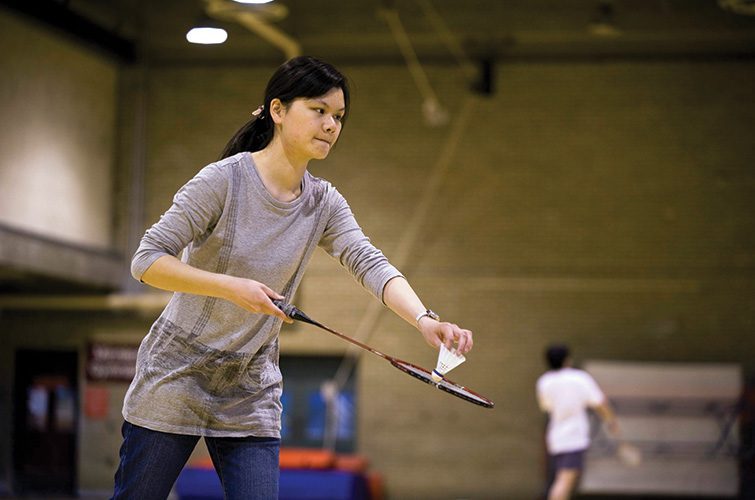
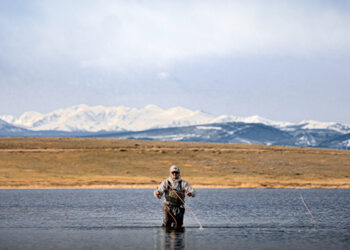







This article obviously didn’t conduct any research on the systemic racism that students and staff of color experience while working at the U of M Rec Center. Next time please ask permission to use my photo when talking about equity–especially when that was the opposite of my experience at this establishment. I have had negative experiences with professional staff photographed in this article, including Dr. George Brown. The Rec called the cops numerous times on Black students due to misidentification, promoted a program that reinforced $1 wages for incarcerated people, fired or coerced staff into quitting for speaking out about racial injustice and was complicit towards racial slurs that were written in the student staff break room. Half of my department quit in protest due to racial injustice and mistreatment at the Rec. This article was written in extremely poor taste with no context on the real experiences that Black people experienced at the Rec Center. Disappointed that people continue to use George Floyd’s name and the movement for Black lives to pat themselves on the back, even though they have actually caused harm on a grand scale. It’s 2021. Do better.
I shared your comment with UMN Recreation and Wellness leadership. RecWell has said, “University Recreation and Wellness is committed to continually improving in the areas of equity, diversity, and inclusion. We invite you to reach out to us at recwell@umn.edu to address your concerns directly.”
This article demonstrates the lack respect and humanity of black lives by this magazine and UMN recwell by using George Floyd’s death as a way to speak to work that has no roots within recwell at the university of Minnesota. It is the very opposite of you would have found if you would have done your journalism research outside the walls of this building.
I shared your comment with UMN Recreation and Wellness leadership. RecWell has said, “University Recreation and Wellness is committed to continually improving in the areas of equity, diversity, and inclusion. We invite you to reach out to us at recwell@umn.edu to address your concerns directly.”